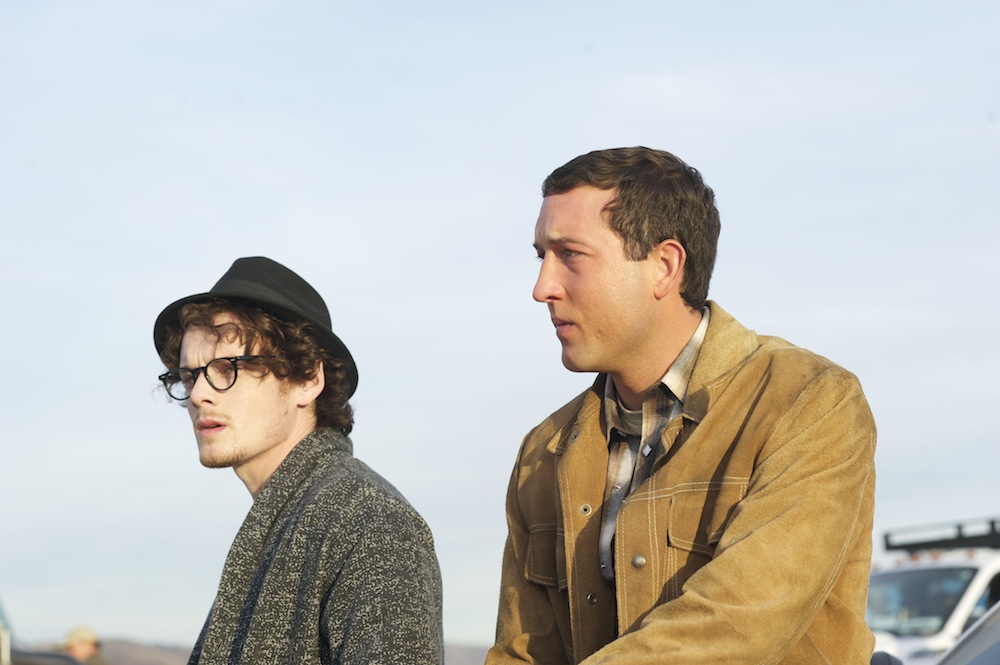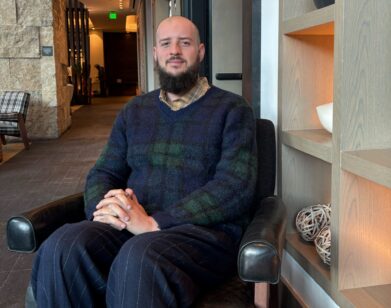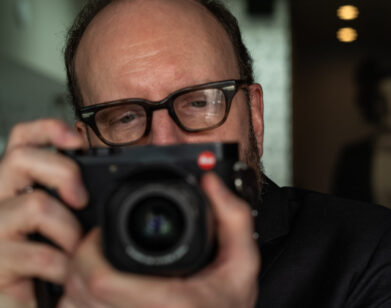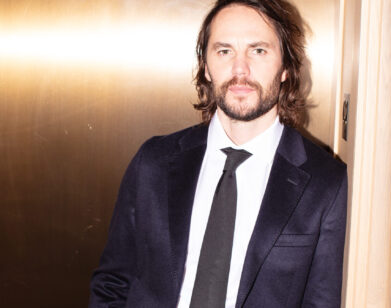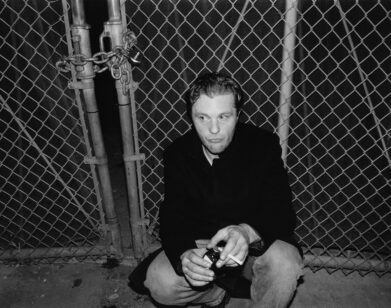Vidhu Vinod Chopra’s Western With an Eastern Heart
In his native India, Vidhu Vinod Chopra needs no introduction. A filmmaker with a career spanning five decades, Chopra was nominated for an Academy Award at age 27 for his documentary short An Encounter With Faces. He went on to make some of Bollywood’s biggest films, including 1942: A Love Story (1994) and the record-breaking 3 Idiots in 2009. Now, with his impressive résumé in hand, Chopra is making his grand American introduction with Broken Horses, out tomorrow.
This time, the director has forgone the show-stopping musical numbers in favor of trying his hand at that all-American genre: the Western crime saga. The film stars Anton Yelchin as Jacob, a Manhattan-based musician set to wed the beautiful Vittoria (María Valverde). When Jacob returns to his rural Texas hometown to retrieve his best man and brother, Buddy (Chris Marquette), he discovers that in his years of absence, the easily manipulated Buddy has given his loyalties to a gun-slinging drug lord Julius Hench (Vincent D’Onofrio). He soon realizes that the only way to save his brother is from the inside out.
BENJAMIN LINDSAY: When you first began making films in the 1970s, was Hollywood always an aspiration of yours?
VIDHU VINOD CHOPRA: Not really. I was nominated for an Oscar in 1979, and then because I was nominated, it kind of stayed with me. The last film I made in India was a film called 3 Idiots, which was huge. I said I can go on making Four Idiots, Five Idiots, Seven Idiots, but that’s not something that interested me. I wanted to challenge myself and really do something out of the box.
LINDSAY: You’ve said in a previous interview that Broken Horses was a case of passion over rationality. Is that what you mean by going “out of the box”?
CHOPRA: For me, rationally, after I made 3 Idiots, I should have produced more movies here [in India]. That would’ve made huge amounts of money. There’s a big market here and in China. But what I chose to do after that was take five years out of my life and travel for one year just on the border of Texas, Arizona, and New Mexico away from my family. If you look at it in terms of rationality, it’s like whoever is your top director there—let’s say Steven Spielberg—takes five years off and says, “I’m obsessed with Bollywood. I want to do a Bollywood film.” I let my passion overrule my rational senses.
LINDSAY: What was it that surprised you most about working in the Hollywood studio system?
CHOPRA: Nobody talks to anybody in that town. If I have to say something, I have to talk to the agent, the agent talks to the lawyer—you’re not even talking to each other. That was a big surprise for me because I come from a place and a culture where we—or at least I—speak my truth, or my thoughts openly and clearly.
LINDSAY: You obviously had an American cast with Vincent D’Onofrio, Anton Yelchin, and Chris Marquette at the helm. Was it Americans working behind the scenes as well, or did you have a stable of people that you’ve previously worked with?
CHOPRA: There was a few people that came from here—my co-writer, Abhijat Joshi, who has been working with me for almost 20 years in India—but primarily the crew was [from] Hollywood. There were three or four people from India. My sister is the co-producer. She was really a great help because she lives in America, so she was really the bridge between me and the American crew in the beginning. But really, there was nobody from India. And that’s what I wanted to do. I didn’t want to take an Indian crew in Hollywood and make a film, what I wanted to do was make a Hollywood film.
LINDSAY: Did you have to come over any prejudices as an Indian filmmaker?
CHOPRA: Huge in the beginning. It took three days, I think, for all the prejudices to break and for my crew to love me, and, of course, it was fantastic because at the end of it—can you imagine?—my American crew worked overtime to gift me a rap video where they’re dancing to Hindi film music, and then they gifted me a book. It’s so precious to me because they said such nice things in that book. It was one of my best filmmaking experiences that I had with the American crew. I just loved the American crew—let me put it that way clearly and up front. I disliked the agents and lawyers, but I loved the crew.
LINDSAY: With Broken Horses, you’re taking on such a classic American genre. Do you feel like your approach as a foreign filmmaker at all allowed you to have a unique perspective on the genre? Did that at all inform you kind of subverting its tropes?
CHOPRA: A critic in New York after a screening said something very unusual. He said, “I see a film every day, and I saw something new after yours.” And I said, “What is new about this?” because I didn’t know. And he said, “What is new is that this film is a Western but has a heart from the East.” I think what happened, really, is that my own idea was to make a full-throttle Hollywood film, but like Sergio Leone, who did not know English and made Spaghetti Westerns, I have made a Western, but I believe it has a heart that’s from the East because that’s who I am. I have made this film honestly to the best of my ability and therefore, it has a little bit of me in it.
LINDSAY: One of the first things I noticed about your script was the character names: You have Buddy and you have Hench. For me, those were immediately indicative of their personality: Buddy is kind of the simple sidekick; Hench is a Henchmen of sorts. Was that intentional?
CHOPRA: It was. I myself learned English when I was 16 years old—”learned” meaning A-B-C. So my English is not so good. English is my third or fourth language, really. So what I did when I started writing, I just gave these names, but then we got so used to those names! I always thought I’d change it later, but then finally we went with the names that I had put in there just for me to understand these characters more than anything else.
LINDSAY: One of my favorite scenes is the montage of hits while cartel leader Mario Vargos Garza get his orange juice pressed. You see similar montage devices used in other classic crime stories—everything from The Godfather to Breaking Bad. Were you drawing inspiration from any film in particular?
CHOPRA: The Godfather has been an influence, but there’s a story that I have to tell. I was so desperate—I couldn’t conceive how to do these Mexican killings. I’m not a great Quentin Tarantino fan, so I didn’t want to show blood and gore and killing. I couldn’t figure out how to do this. Finally, I sat—it was afternoon, it was very warm, and I just took my glasses off and I just said, “How do I do it?” I look up, and I was under an orange tree. And I saw oranges and I told my co-producer and my assistant director, “You know what? Oranges. Let’s use oranges.” It was a spur-of-the-moment thing.
LINDSAY: Another memorable scene was when Hench is in the chapel that his wife used to attend, and he kind of loses it. What was that all about?
CHOPRA: You see, that’s a very interesting element because there’s guilt in Hench, clearly, which as a Christian, he feels. But at the same time, his wife has built this church, has helped this church, he goes there, and he’s doing his best, and then he sees Jesus and Mary, of course, and that reminds him of his own son, and then a candle is lit because there’s a new priest there who doesn’t know about Julius Hench’s fear of fire, and the whole thing becomes completely crazy. Finally, you see his reflection in the tombstone of his wife. The whole convoluted state of mind of Hench, for me, was conveyed in that scene. You see Jesus, you see Mother Mary, you see fire, you see the reflection. But what is guilt? The convoluted personality of Hench comes across in that scene.
LINDSAY: The scene adds depth to him that you otherwise wouldn’t see.
CHOPRA: To me, a “bad guy” is not a bad guy in a way that it’s really circumstances that have led him to that place where he is now. In that given moment when he came to know his wife was leaving him and taking the kid away, he lost his temper—he just lost it, and he did something horrific for which he will not forgive himself for the rest of his life. He’s found an explanation saying, “You have to kill and put to the rest someone you love the most.” But it’s highly convoluted.
LINDSAY: That goes back to what Alfonso Cuarón actually said about your films—that they’re grounded in the fact that these characters are driven by love. And even a character like Hench—he’s driven by love.
CHOPRA: He’s driven by love, absolutely right.
LINDSAY: Why did you decide to give Buddy a mental handicap?
CHOPRA: I had to make him slow because as I studied American culture, I realized that if the brother was not slow, he might just say, “I don’t give a fuck about my other brother.” I made him slow because that then gave him the purity of emotion. The moment Buddy became slow, he became real. He became childlike. This is the 62nd draft of the film, that shot. For the first 10 or 12 drafts, he was not slow.
LINDSAY: Now that Broken Horses has wrapped, what else are you working on?
CHOPRA: Well, there are a couple of films that have been offered to me by studios in America. Lionsgate is talking to us. Sony—I’m talking to Michael Lynton. Hopefully something will come out of it. But also, I am busy in India. For me, Hollywood is just another option. I’m not looking for a job. So if something exciting comes out of there, I’ll be very happy.
LINDSAY: You’re the first of your kind to come from Bollywood to Hollywood. Do you think you’ll be alone as the first for long?
CHOPRA: I would hate to be the first for long. I’ve done it, now it’s all done, and now other people should take over. It’s like a relay race: I’ve done my bit, now others should run.
BROKEN HORSES IS IN SELECT THEATERS TOMORROW, APRIL 10. FOR MORE INFORMATION ON THE FILM AND VIDHU VINOD CHOPRA, VISIT THE DIRECTOR’S WEBSITE.

